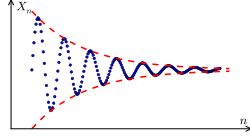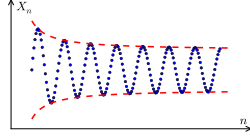
Back متتالية كوشي Arabic Fundamental ardıcıllıq Azerbaijani Фундаментальная паслядоўнасць Byelorussian Редица на Коши Bulgarian কোশি অনুক্রম Bengali/Bangla Successió de Cauchy Catalan پاشیەکیی کۆشی CKB Cauchyovská posloupnost Czech Cauchyfølge Danish Cauchy-Folge German
In mathematics, a Cauchy sequence is a sequence whose elements become arbitrarily close to each other as the sequence progresses.[1] More precisely, given any small positive distance, all excluding a finite number of elements of the sequence are less than that given distance from each other. Cauchy sequences are named after Augustin-Louis Cauchy; they may occasionally be known as fundamental sequences.[2]
It is not sufficient for each term to become arbitrarily close to the preceding term. For instance, in the sequence of square roots of natural numbers: the consecutive terms become arbitrarily close to each other – their differences tend to zero as the index n grows. However, with growing values of n, the terms become arbitrarily large. So, for any index n and distance d, there exists an index m big enough such that As a result, no matter how far one goes, the remaining terms of the sequence never get close to each other; hence the sequence is not Cauchy.
The utility of Cauchy sequences lies in the fact that in a complete metric space (one where all such sequences are known to converge to a limit), the criterion for convergence depends only on the terms of the sequence itself, as opposed to the definition of convergence, which uses the limit value as well as the terms. This is often exploited in algorithms, both theoretical and applied, where an iterative process can be shown relatively easily to produce a Cauchy sequence, consisting of the iterates, thus fulfilling a logical condition, such as termination.
Generalizations of Cauchy sequences in more abstract uniform spaces exist in the form of Cauchy filters and Cauchy nets.
© MMXXIII Rich X Search. We shall prevail. All rights reserved. Rich X Search








